Attached files
| file | filename |
|---|---|
| 8-K - FORM 8-K - ZF TRW AUTOMOTIVE HOLDINGS CORP | k49544e8vk.htm |
Exhibit 14.1
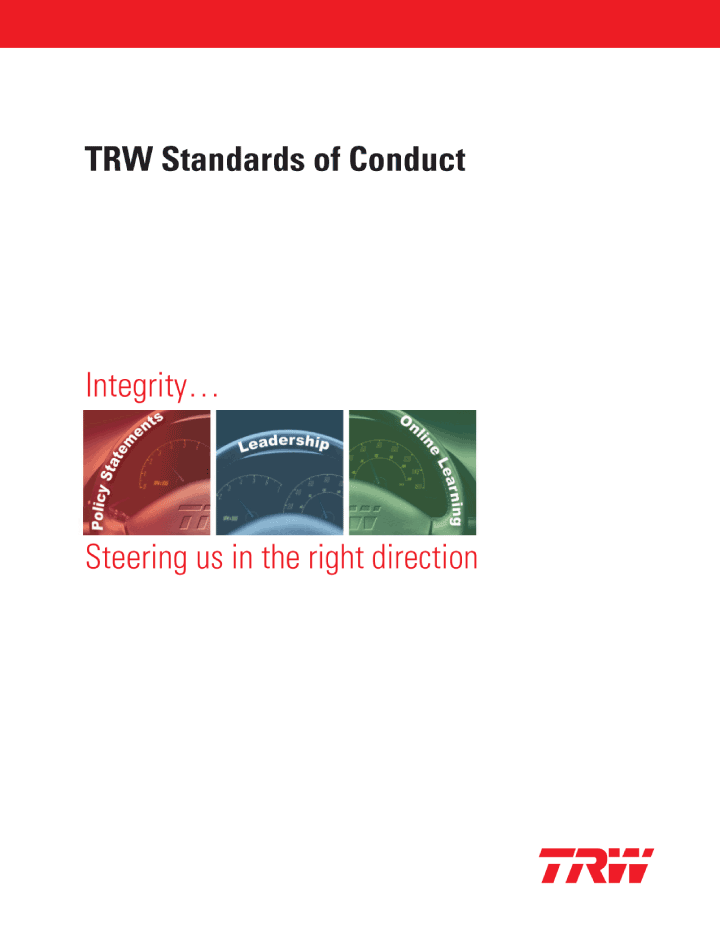
| TRW Standards of Conduct Integrity Steering us in the right direction |
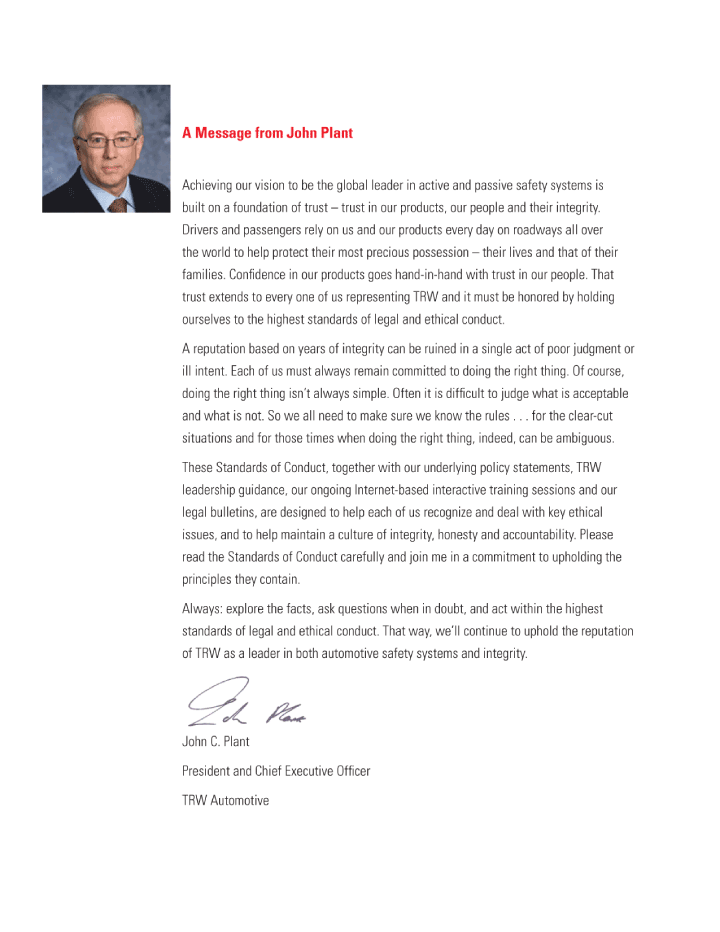
| A Message from John Plant Achieving our vision to be the global leader in active and passive safety systems is built on a foundation of trust – trust in our products, our people and their integrity. Drivers and passengers rely on us and our products every day on roadways all over the world to help protect their most precious possession – their lives and that of their families. Confi dence in our products goes hand-in-hand with trust in our people. That trust extends to every one of us representing TRW and it must be honored by holding ourselves to the highest standards of legal and ethical conduct. A reputation based on years of integrity can be ruined in a single act of poor judgment or ill intent. Each of us must always remain committed to doing the right thing. Of course, doing the right thing isn’t always simple. Often it is diffi cult to judge what is acceptable and what is not. So we all need to make sure we know the rules . . . for the clear-cut situations and for those times when doing the right thing, indeed, can be ambiguous. These Standards of Conduct, together with our underlying policy statements, TRW leadership guidance, our ongoing Internet-based interactive training sessions and our legal bulletins, are designed to help each of us recognize and deal with key ethical issues, and to help maintain a culture of integrity, honesty and accountability. Please read the Standards of Conduct carefully and join me in a commitment to upholding the principles they contain. Always: explore the facts, ask questions when in doubt, and act within the highest standards of legal and ethical conduct. That way, we’ll continue to uphold the reputation of TRW as a leader in both automotive safety systems and integrity.John C. PlantPresident and Chief Executive Offi cer TRW Automotive |
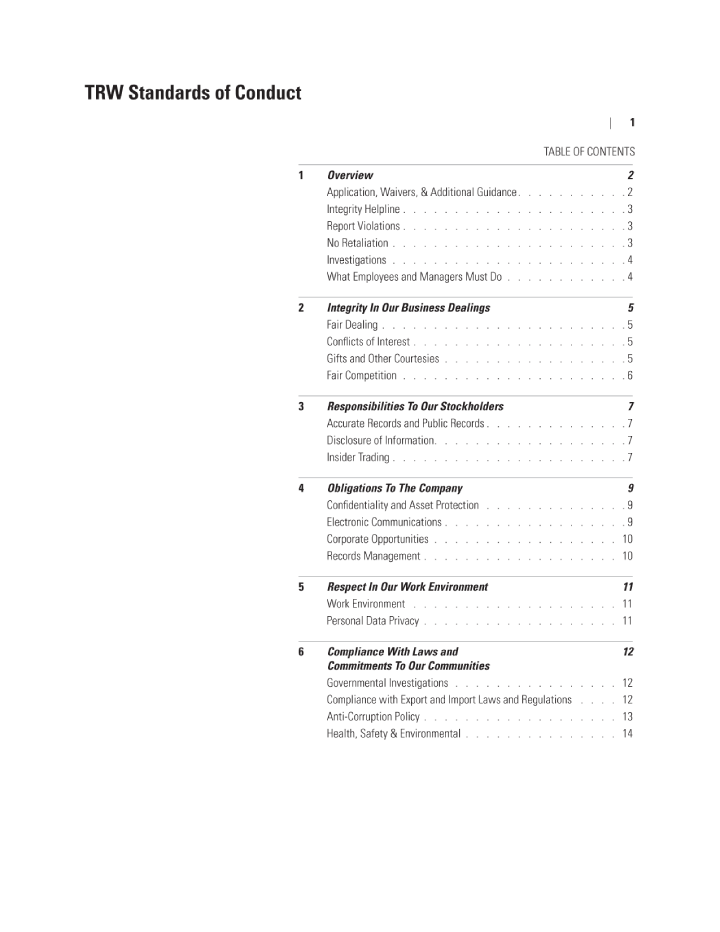
| TRW Standards of Conduct TABLE OF CONTENTS 1 Overview 2 Application, Waivers, & Additional Guidance2 Integrity Helpline 3 Report Violations 3 No Retaliation 3 Investigations4 What Employees and Managers Must Do4 2 Integrity In Our Business Dealings 5 Fair Dealing 5 Confl icts of Interest 5 Gifts and Other Courtesies 5 Fair Competition 6 Responsibilities To Our Stockholders 7 Accurate Records and Public Records 7 Disclosure of Information 7 Insider Trading 7 4 Obligations To The Company 9 Confi dentiality and Asset Protection 9 Electronic Communications 9 Corporate Opportunities 10 Records Management10 5 Respect In Our Work Environment 11 Work Environment 11 Personal Data Privacy11 6 Compliance With Laws and 12 Commitments To Our Communities Governmental Investigations 12 Compliance with Export and Import Laws and Regulations 12 Anti-Corruption Policy13 Health, Safety & Environmental14 |
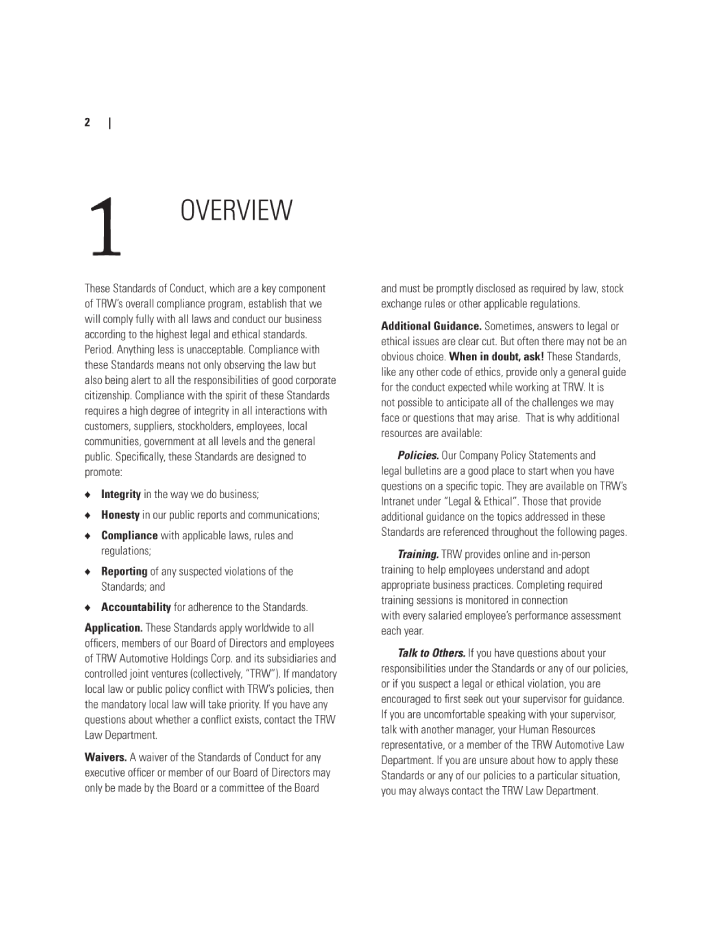
| 2 1 OVERVIEW These Standards of Conduct, which are a key component of TRW’s overall compliance program, establish that we will comply fully with all laws and conduct our business according to the highest legal and ethical standards Period Anything less is unacceptable Compliance with these Standards means not only observing the law but also being alert to all the responsibilities of good corporate citizenship Compliance with the spirit of these Standards requires a high degree of integrity in all interactions with customers, suppliers, stockholders, employees, local communities, government at all levels and the general public Specifi cally, these Standards are designed to promote: Integrity in the way we do business; Honesty in our public reports and communications; Compliance with applicable laws, rules and regulations; Reporting of any suspected violations of the Standards; and Accountability for adherence to the Standards Application These Standards apply worldwide to all offi cers, members of our Board of Directors and employees of TRW Automotive Holdings Corp and its subsidiaries and controlled joint ventures (collectively, “TRW”) If mandatory local law or public policy confl ict with TRW’s policies, then the mandatory local law will take priority If you have any questions about whether a confl ict exists, contact the TRW Law Department Waivers A waiver of the Standards of Conduct for any executive offi cer or member of our Board of Directors may only be made by the Board or a committee of the Board and must be promptly disclosed as required by law, stock exchange rules or other applicable regulations Additional Guidance Sometimes, answers to legal or ethical issues are clear cut But often there may not be an obvious choice When in doubt, ask! These Standards, like any other code of ethics, provide only a general guide for the conduct expected while working at TRW It is not possible to anticipate all of the challenges we may face or questions that may arise That is why additional resources are available: Policies Our Company Policy Statements and legal bulletins are a good place to start when you have questions on a specifi c topic They are available on TRW’s Intranet under “Legal & Ethical” Those that provide additional guidance on the topics addressed in these Standards are referenced throughout the following pages Training TRW provides online and in-person training to help employees understand and adopt appropriate business practices Completing required training sessions is monitored in connection with every salaried employee’s performance assessment each year Talk to Others If you have questions about your responsibilities under the Standards or any of our policies, or if you suspect a legal or ethical violation, you are encouraged to fi rst seek out your supervisor for guidance If you are uncomfortable speaking with your supervisor, talk with another manager, your Human Resources representative, or a member of the TRW Automotive Law Department If you are unsure about how to apply these Standards or any of our policies to a particular situation, you may always contact the TRW Law Department |
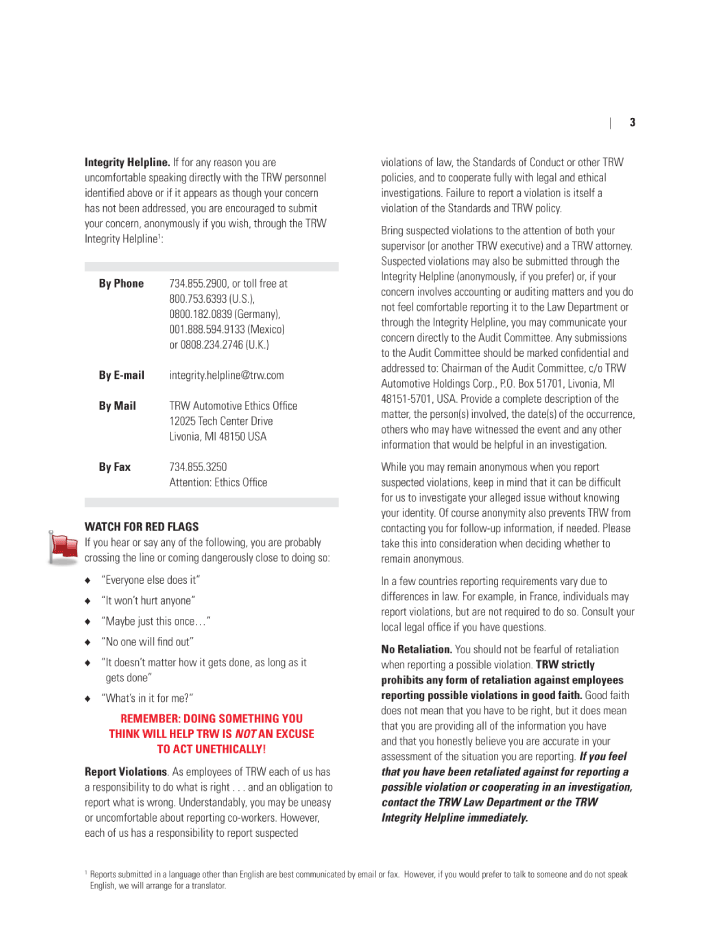
| Integrity Helpline If for any reason you are uncomfortable speaking directly with the TRW personnel identifi ed above or if it appears as though your concern has not been addressed, you are encouraged to submit your concern, anonymously if you wish, through the TRW Integrity Helpline1: By Phone 734 855 2900, or toll free at 800 753 6393 (U S ), 0800 182 0839 (Germany), 001 888 594 9133 (Mexico) or 0808 234 2746 (U K ) By E-mail integrity helpline@trw com By Mail TRW Automotive Ethics Offi ce 12025 Tech Center Drive Livonia, MI 48150 USA By Fax 734 855 3250 Attention: Ethics Offi ce WATCH FOR RED FLAGS If you hear or say any of the following, you are probably crossing the line or coming dangerously close to doing so: “Everyone else does it” “It won’t hurt anyone” “Maybe just this once...” “No one will fi nd out” “It doesn’t matter how it gets done, as long as it gets done” “What’s in it for me?” REMEMBER: DOING SOMETHING YOU THINK WILL HELP TRW IS NOT AN EXCUSE TO ACT UNETHICALLY! Report Violations As employees of TRW each of us has a responsibility to do what is right and an obligation to report what is wrong Understandably, you may be uneasy or uncomfortable about reporting co-workers However, each of us has a responsibility to report suspected violations of law, the Standards of Conduct or other TRW policies, and to cooperate fully with legal and ethical investigations Failure to report a violation is itself a violation of the Standards and TRW policy Bring suspected violations to the attention of both your supervisor (or another TRW executive) and a TRW attorney Suspected violations may also be submitted through the Integrity Helpline (anonymously, if you prefer) or, if your concern involves accounting or auditing matters and you do not feel comfortable reporting it to the Law Department or through the Integrity Helpline, you may communicate your concern directly to the Audit Committee Any submissions to the Audit Committee should be marked confi dential and addressed to: Chairman of the Audit Committee, c/o TRW Automotive Holdings Corp , P O Box 51701, Livonia, MI 48151-5701, USA Provide a complete description of the matter, the person(s) involved, the date(s) of the occurrence, others who may have witnessed the event and any other information that would be helpful in an investigation While you may remain anonymous when you report suspected violations, keep in mind that it can be diffi cult for us to investigate your alleged issue without knowing your identity Of course anonymity also prevents TRW from contacting you for follow-up information, if needed Please take this into consideration when deciding whether to remain anonymous In a few countries reporting requirements vary due to differences in law For example, in France, individuals may report violations, but are not required to do so Consult your local legal offi ce if you have questions No Retaliation You should not be fearful of retaliation when reporting a possible violation TRW strictly prohibits any form of retaliation against employees reporting possible violations in good faith Good faith does not mean that you have to be right, but it does mean that you are providing all of the information you have and that you honestly believe you are accurate in your assessment of the situation you are reporting If you feel that you have been retaliated against for reporting a possible violation or cooperating in an investigation, contact the TRW Law Department or the TRW Integrity Helpline immediately 1 Reports submitted in a language other than English are best communicated by email or fax However, if you would prefer to talk to someone and do not speak English, we will arrange for a translator |
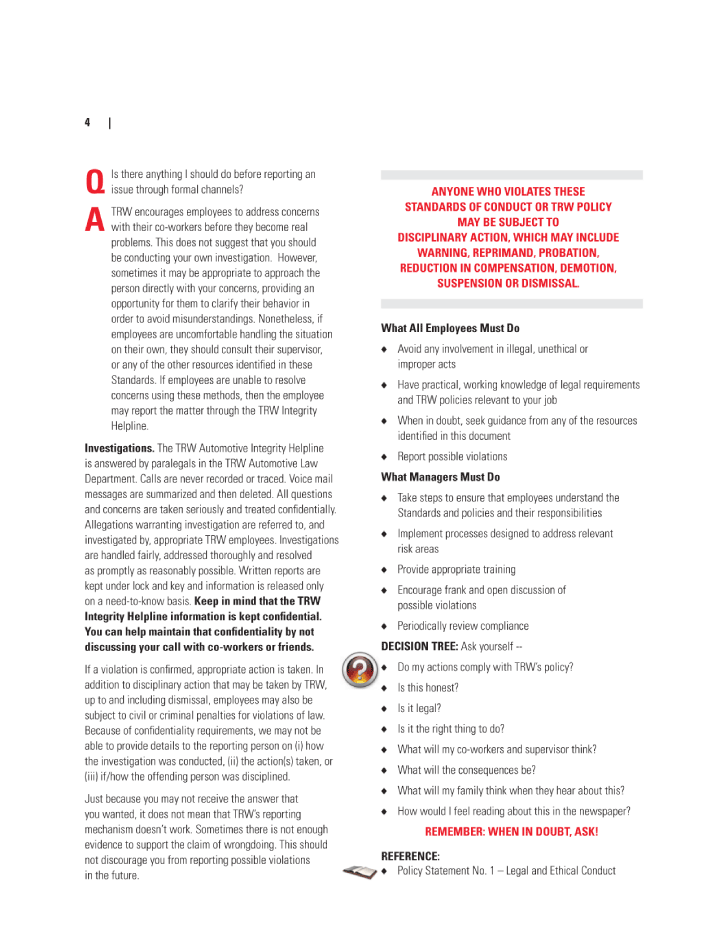
| Q Is there anything I should do before reporting an issue through formal channels? A TRW encourages employees to address concerns with their co-workers before they become real problems This does not suggest that you should be conducting your own investigation However, sometimes it may be appropriate to approach the person directly with your concerns, providing an opportunity for them to clarify their behavior in order to avoid misunderstandings Nonetheless, if employees are uncomfortable handling the situation on their own, they should consult their supervisor, or any of the other resources identifi ed in these Standards If employees are unable to resolve concerns using these methods, then the employee may report the matter through the TRW Integrity Helpline Investigations The TRW Automotive Integrity Helpline is answered by paralegals in the TRW Automotive Law Department Calls are never recorded or traced Voice mail messages are summarized and then deleted All questions and concerns are taken seriously and treated confi dentially Allegations warranting investigation are referred to, and investigated by, appropriate TRW employees Investigations are handled fairly, addressed thoroughly and resolved as promptly as reasonably possible Written reports are kept under lock and key and information is released only on a need-to-know basis Keep in mind that the TRW Integrity Helpline information is kept confi dential You can help maintain that confi dentiality by not discussing your call with co-workers or friends If a violation is confi rmed, appropriate action is taken In addition to disciplinary action that may be taken by TRW, up to and including dismissal, employees may also be subject to civil or criminal penalties for violations of law Because of confi dentiality requirements, we may not be able to provide details to the reporting person on (i) how the investigation was conducted, (ii) the action(s) taken, or (iii) if/how the offending person was disciplined Just because you may not receive the answer that you wanted, it does not mean that TRW’s reporting mechanism doesn’t work Sometimes there is not enough evidence to support the claim of wrongdoing This should not discourage you from reporting possible violations in the future ANYONE WHO VIOLATES THESE STANDARDS OF CONDUCT OR TRW POLICY MAY BE SUBJECT TO DISCIPLINARY ACTION, WHICH MAY INCLUDE WARNING, REPRIMAND, PROBATION, REDUCTION IN COMPENSATION, DEMOTION, SUSPENSION OR DISMISSAL What All Employees Must Do Avoid any involvement in illegal, unethical or improper acts Have practical, working knowledge of legal requirements and TRW policies relevant to your job When in doubt, seek guidance from any of the resources identifi ed in this document Report possible violations What Managers Must Do Take steps to ensure that employees understand the Standards and policies and their responsibilities Implement processes designed to address relevant risk areas Provide appropriate training Encourage frank and open discussion of possible violations 3 Periodically review compliance DECISION TREE: Ask yourself — Do my actions comply with TRW’s policy? Is this honest? Is it legal? Is it the right thing to do? What will my co-workers and supervisor think? What will the consequences be? What will my family think when they hear about this? How would I feel reading about this in the newspaper? REMEMBER: WHEN IN DOUBT, ASK! REFERENCE: Policy Statement No 1 – Legal and Ethical Conduct |
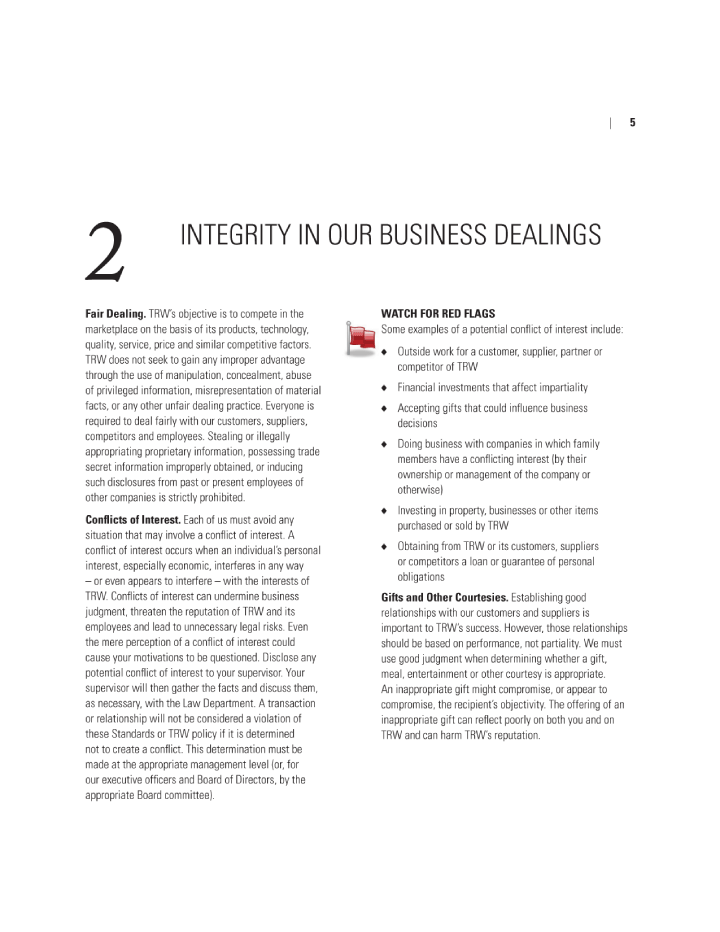
| INTEGRITY IN OUR BUSINESS DEALINGS Fair Dealing TRW’s objective is to compete in the marketplace on the basis of its products, technology, quality, service, price and similar competitive factors TRW does not seek to gain any improper advantage through the use of manipulation, concealment, abuse of privileged information, misrepresentation of material facts, or any other unfair dealing practice Everyone is required to deal fairly with our customers, suppliers, competitors and employees Stealing or illegally appropriating proprietary information, possessing trade secret information improperly obtained, or inducing such disclosures from past or present employees of other companies is strictly prohibited Confl icts of Interest Each of us must avoid any situation that may involve a confl ict of interest A confl ict of interest occurs when an individual’s personal interest, especially economic, interferes in any way – or even appears to interfere – with the interests of TRW Confl icts of interest can undermine business judgment, threaten the reputation of TRW and its employees and lead to unnecessary legal risks Even the mere perception of a confl ict of interest could cause your motivations to be questioned Disclose any potential confl ict of interest to your supervisor Your supervisor will then gather the facts and discuss them, as necessary, with the Law Department A transaction or relationship will not be considered a violation of these Standards or TRW policy if it is determined not to create a confl ict This determination must be made at the appropriate management level (or, for our executive offi cers and Board of Directors, by the appropriate Board committee) WATCH FOR RED FLAGS Some examples of a potential confl ict of interest include: Outside work for a customer, supplier, partner or competitor of TRW Financial investments that affect impartiality Accepting gifts that could infl uence business decisions Doing business with companies in which family members have a confl icting interest (by their ownership or management of the company or otherwise) Investing in property, businesses or other items purchased or sold by TRW Obtaining from TRW or its customers, suppliers or competitors a loan or guarantee of personal obligations Gifts and Other Courtesies Establishing good relationships with our customers and suppliers is important to TRW’s success However, those relationships should be based on performance, not partiality We must use good judgment when determining whether a gift, meal, entertainment or other courtesy is appropriate An inappropriate gift might compromise, or appear to compromise, the recipient’s objectivity The offering of an inappropriate gift can refl ect poorly on both you and on TRW and can harm TRW’s reputation |
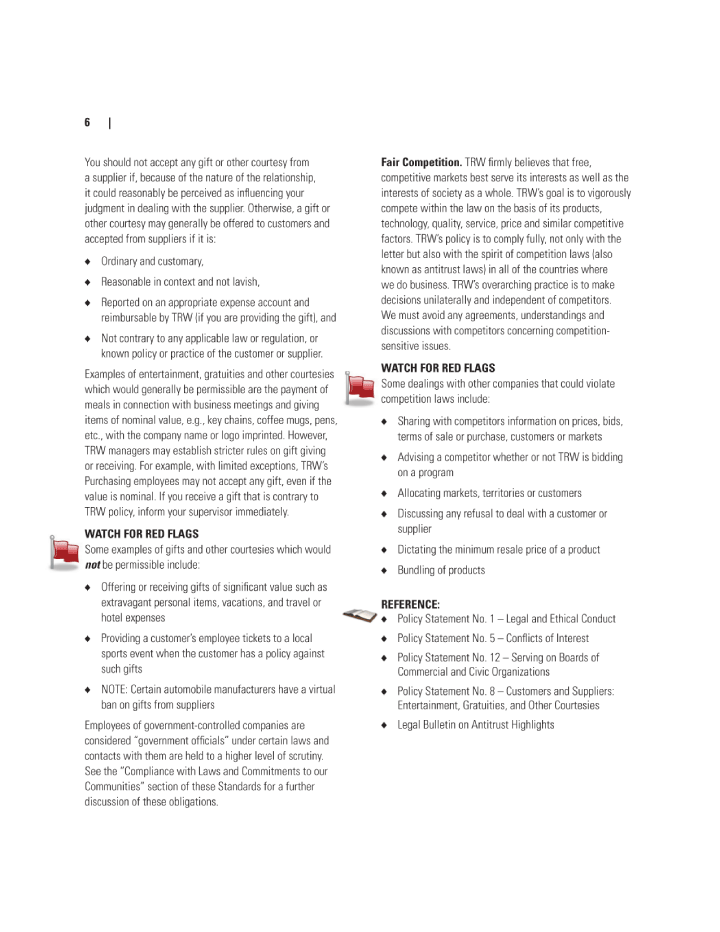
| You should not accept any gift or other courtesy from a supplier if, because of the nature of the relationship, it could reasonably be perceived as infl uencing your judgment in dealing with the supplier Otherwise, a gift or other courtesy may generally be offered to customers and accepted from suppliers if it is: Ordinary and customary, Reasonable in context and not lavish, Reported on an appropriate expense account and reimbursable by TRW (if you are providing the gift), and Not contrary to any applicable law or regulation, or known policy or practice of the customer or supplier Examples of entertainment, gratuities and other courtesies which would generally be permissible are the payment of meals in connection with business meetings and giving items of nominal value, e g , key chains, coffee mugs, pens, etc , with the company name or logo imprinted However, TRW managers may establish stricter rules on gift giving or receiving For example, with limited exceptions, TRW’s Purchasing employees may not accept any gift, even if the value is nominal If you receive a gift that is contrary to TRW policy, inform your supervisor immediately WATCH FOR RED FLAGS Some examples of gifts and other courtesies which would not be permissible include: Offering or receiving gifts of signifi cant value such as extravagant personal items, vacations, and travel or hotel expenses Providing a customer’s employee tickets to a local sports event when the customer has a policy against such gifts NOTE: Certain automobile manufacturers have a virtual ban on gifts from suppliers Employees of government-controlled companies are considered “government offi cials” under certain laws and contacts with them are held to a higher level of scrutiny See the “Compliance with Laws and Commitments to our Communities” section of these Standards for a further discussion of these obligations Fair Competition TRW fi rmly believes that free, competitive markets best serve its interests as well as the interests of society as a whole TRW’s goal is to vigorously compete within the law on the basis of its products, technology, quality, service, price and similar competitive factors TRW’s policy is to comply fully, not only with the letter but also with the spirit of competition laws (also known as antitrust laws) in all of the countries where we do business TRW’s overarching practice is to make decisions unilaterally and independent of competitors We must avoid any agreements, understandings and discussions with competitors concerning competition-sensitive issues WATCH FOR RED FLAGS Some dealings with other companies that could violate competition laws include: Sharing with competitors information on prices, bids, terms of sale or purchase, customers or markets Advising a competitor whether or not TRW is bidding on a program Allocating markets, territories or customers Discussing any refusal to deal with a customer or supplier Dictating the minimum resale price of a product Bundling of products REFERENCE: Policy Statement No 1 – Legal and Ethical Conduct Policy Statement No 5 – Confl icts of Interest Policy Statement No 12 – Serving on Boards of Commercial and Civic Organizations Policy Statement No 8 – Customers and Suppliers: Entertainment, Gratuities, and Other Courtesies Legal Bulletin on Antitrust Highlights |
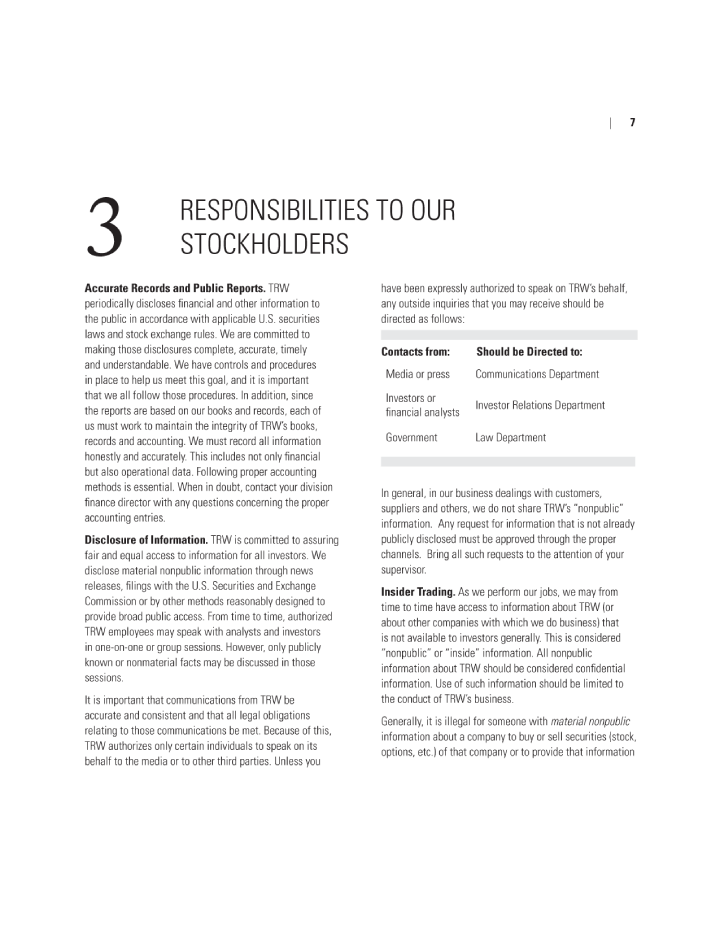
| RESPONSIBILITIES TO OUR STOCKHOLDERS Accurate Records and Public Reports TRW periodically discloses fi nancial and other information to the public in accordance with applicable U S securities laws and stock exchange rules We are committed to making those disclosures complete, accurate, timely and understandable We have controls and procedures in place to help us meet this goal, and it is important that we all follow those procedures In addition, since the reports are based on our books and records, each of us must work to maintain the integrity of TRW’s books, records and accounting We must record all information honestly and accurately This includes not only fi nancial but also operational data Following proper accounting methods is essential When in doubt, contact your division fi nance director with any questions concerning the proper accounting entries Disclosure of Information TRW is committed to assuring fair and equal access to information for all investors We disclose material nonpublic information through news releases, fi lings with the U S Securities and Exchange Commission or by other methods reasonably designed to provide broad public access From time to time, authorized TRW employees may speak with analysts and investors in one-on-one or group sessions However, only publicly known or nonmaterial facts may be discussed in those sessions It is important that communications from TRW be accurate and consistent and that all legal obligations relating to those communications be met Because of this, TRW authorizes only certain individuals to speak on its behalf to the media or to other third parties Unless you have been expressly authorized to speak on TRW’s behalf, any outside inquiries that you may receive should be directed as follows: Contacts from: Should be Directed to: Media or press Communications Department Investors or Investor Relations Department fi nancial analysts Government Law Department In general, in our business dealings with customers, suppliers and others, we do not share TRW’s “nonpublic” information Any request for information that is not already publicly disclosed must be approved through the proper channels Bring all such requests to the attention of your supervisor Insider Trading As we perform our jobs, we may from time to time have access to information about TRW (or about other companies with which we do business) that is not available to investors generally This is considered “nonpublic” or “inside” information All nonpublic information about TRW should be considered confi dential information Use of such information should be limited to the conduct of TRW’s business Generally, it is illegal for someone with material nonpublic information about a company to buy or sell securities (stock, options, etc ) of that company or to provide that information |
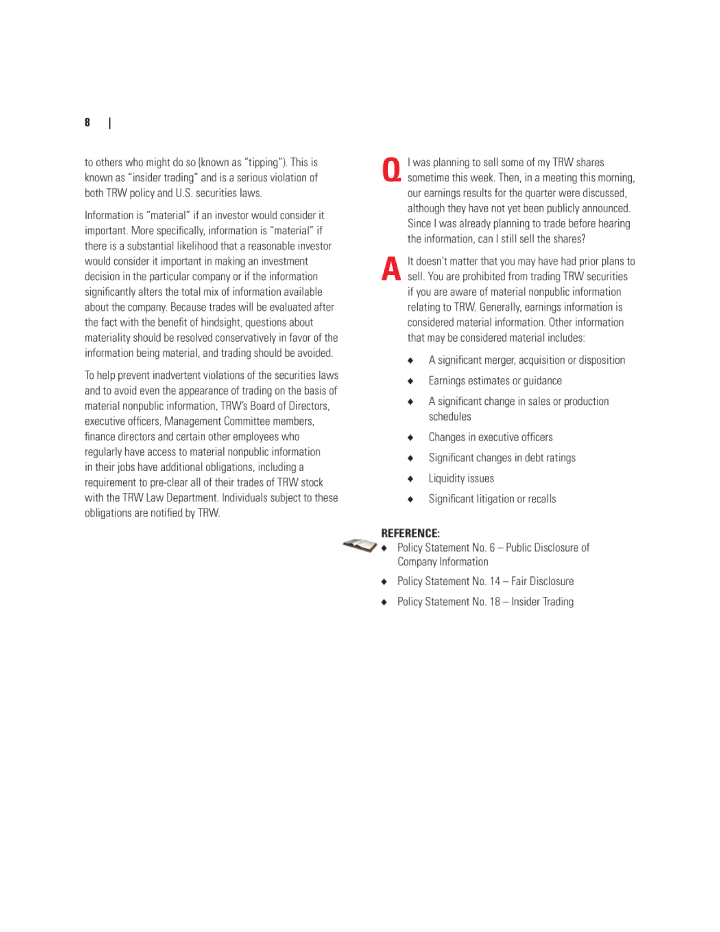
| to others who might do so (known as “tipping”) This is known as “insider trading” and is a serious violation of both TRW policy and U S securities laws Information is “material” if an investor would consider it important More specifi cally, information is “material” if there is a substantial likelihood that a reasonable investor would consider it important in making an investment decision in the particular company or if the information signifi cantly alters the total mix of information available about the company Because trades will be evaluated after the fact with the benefi t of hindsight, questions about materiality should be resolved conservatively in favor of the information being material, and trading should be avoided To help prevent inadvertent violations of the securities laws and to avoid even the appearance of trading on the basis of material nonpublic information, TRW’s Board of Directors, executive offi cers, Management Committee members, fi nance directors and certain other employees who regularly have access to material nonpublic information in their jobs have additional obligations, including a requirement to pre-clear all of their trades of TRW stock with the TRW Law Department Individuals subject to these obligations are notifi ed by TRW I was planning to sell some of my TRW shares sometime this week Then, in a meeting this morning, our earnings results for the quarter were discussed, although they have not yet been publicly announced Since I was already planning to trade before hearing the information, can I still sell the shares? It doesn’t matter that you may have had prior plans to sell You are prohibited from trading TRW securities if you are aware of material nonpublic information relating to TRW Generally, earnings information is considered material information Other information that may be considered material includes: A signifi cant merger, acquisition or disposition Earnings estimates or guidance A signifi cant change in sales or production schedules Changes in executive offi cers Signifi cant changes in debt ratings Liquidity issues Signifi cant litigation or recalls REFERENCE: Policy Statement No 6 – Public Disclosure of Company Information Policy Statement No 14 – Fair Disclosure Policy Statement No 18 – Insider Trading |
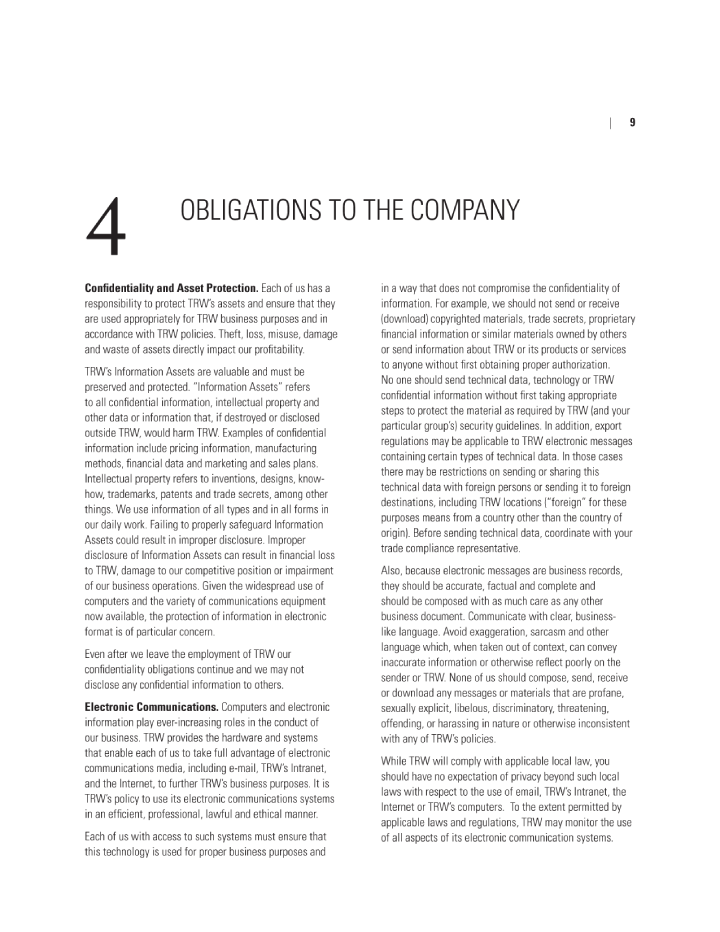
| OBLIGATIONS TO THE COMPANY Confi dentiality and Asset Protection Each of us has a responsibility to protect TRW’s assets and ensure that they are used appropriately for TRW business purposes and in accordance with TRW policies Theft, loss, misuse, damage and waste of assets directly impact our profi tability TRW’s Information Assets are valuable and must be preserved and protected “Information Assets” refers to all confi dential information, intellectual property and other data or information that, if destroyed or disclosed outside TRW, would harm TRW Examples of confi dential information include pricing information, manufacturing methods, fi nancial data and marketing and sales plans Intellectual property refers to inventions, designs, knowhow, trademarks, patents and trade secrets, among other things We use information of all types and in all forms in our daily work Failing to properly safeguard Information Assets could result in improper disclosure Improper disclosure of Information Assets can result in fi nancial loss to TRW, damage to our competitive position or impairment of our business operations Given the widespread use of computers and the variety of communications equipment now available, the protection of information in electronic format is of particular concern Even after we leave the employment of TRW our confi dentiality obligations continue and we may not disclose any confi dential information to others Electronic Communications Computers and electronic information play ever-increasing roles in the conduct of our business TRW provides the hardware and systems that enable each of us to take full advantage of electronic communications media, including e-mail, TRW’s Intranet, and the Internet, to further TRW’s business purposes It is TRW’s policy to use its electronic communications systems in an effi cient, professional, lawful and ethical manner Each of us with access to such systems must ensure that this technology is used for proper business purposes and in a way that does not compromise the confi dentiality of information For example, we should not send or receive (download) copyrighted materials, trade secrets, proprietary fi nancial information or similar materials owned by others or send information about TRW or its products or services to anyone without fi rst obtaining proper authorization No one should send technical data, technology or TRW confi dential information without fi rst taking appropriate steps to protect the material as required by TRW (and your particular group’s) security guidelines In addition, export regulations may be applicable to TRW electronic messages containing certain types of technical data In those cases there may be restrictions on sending or sharing this technical data with foreign persons or sending it to foreign destinations, including TRW locations (“foreign” for these purposes means from a country other than the country of origin) Before sending technical data, coordinate with your trade compliance representative Also, because electronic messages are business records, they should be accurate, factual and complete and should be composed with as much care as any other business document Communicate with clear, businesslike language Avoid exaggeration, sarcasm and other language which, when taken out of context, can convey inaccurate information or otherwise refl ect poorly on the sender or TRW None of us should compose, send, receive or download any messages or materials that are profane, sexually explicit, libelous, discriminatory, threatening, offending, or harassing in nature or otherwise inconsistent with any of TRW’s policies While TRW will comply with applicable local law, you should have no expectation of privacy beyond such local laws with respect to the use of email, TRW’s Intranet, the Internet or TRW’s computers To the extent permitted by applicable laws and regulations, TRW may monitor the use of all aspects of its electronic communication system s |
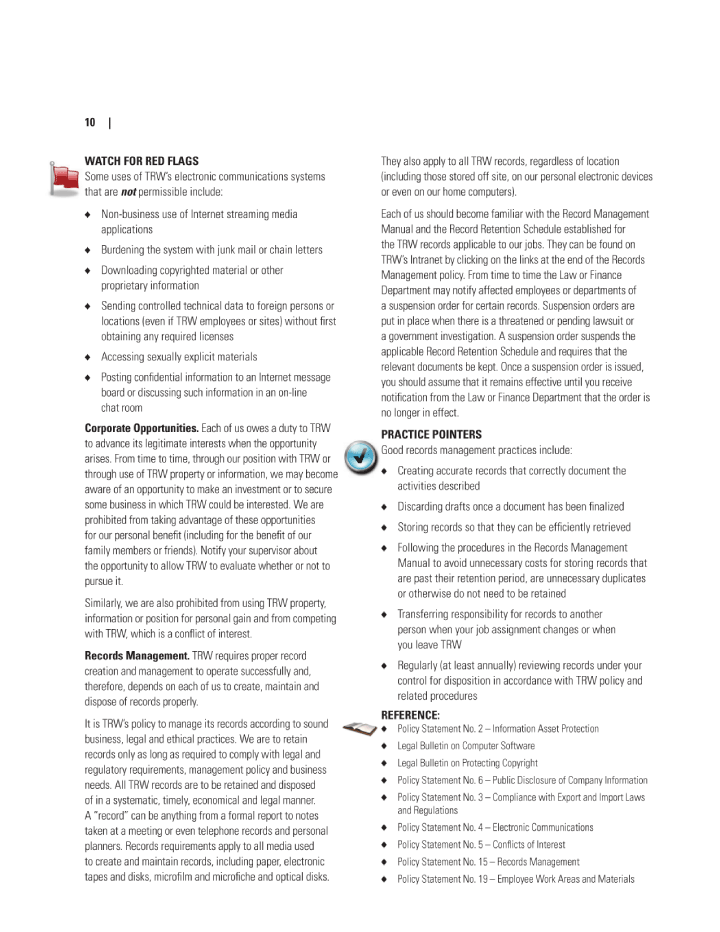
| WATCH FOR RED FLAGS Some uses of TRW’s electronic communications systems that are not permissible include: Non-business use of Internet streaming media applications Burdening the system with junk mail or chain letters Downloading copyrighted material or other proprietary information Sending controlled technical data to foreign persons or locations (even if TRW employees or sites) without fi rst obtaining any required licenses Accessing sexually explicit materials Posting confi dential information to an Internet message board or discussing such information in an on-line chat room Corporate Opportunities Each of us owes a duty to TRW to advance its legitimate interests when the opportunity arises From time to time, through our position with TRW or through use of TRW property or information, we may become aware of an opportunity to make an investment or to secure some business in which TRW could be interested We are prohibited from taking advantage of these opportunities for our personal benefi t (including for the benefi t of our family members or friends) Notify your supervisor about the opportunity to allow TRW to evaluate whether or not to pursue it Similarly, we are also prohibited from using TRW property, information or position for personal gain and from competing with TRW, which is a confl ict of interest Records Management TRW requires proper record creation and management to operate successfully and, therefore, depends on each of us to create, maintain and dispose of records properly It is TRW’s policy to manage its records according to sound business, legal and ethical practices We are to retain records only as long as required to comply with legal and regulatory requirements, management policy and business needs All TRW records are to be retained and disposed of in a systematic, timely, economical and legal manner A “record” can be anything from a formal report to notes taken at a meeting or even telephone records and personal planners Records requirements apply to all media used to create and maintain records, including paper, electronic tapes and disks, microfi lm and microfi che and optical disks They also apply to all TRW records, regardless of location (including those stored off site, on our personal electronic devices or even on our home computers) Each of us should become familiar with the Record Management Manual and the Record Retention Schedule established for the TRW records applicable to our jobs They can be found on TRW’s Intranet by clicking on the links at the end of the Records Management policy From time to time the Law or Finance Department may notify affected employees or departments of a suspension order for certain records Suspension orders are put in place when there is a threatened or pending lawsuit or a government investigation A suspension order suspends the applicable Record Retention Schedule and requires that the relevant documents be kept Once a suspension order is issued, you should assume that it remains effective until you receive notifi cation from the Law or Finance Department that the order is no longer in effect PRACTICE POINTERS Good records management practices include: Creating accurate records that correctly document the activities described Discarding drafts once a document has been fi nalized Storing records so that they can be effi ciently retrieved Following the procedures in the Records Management Manual to avoid unnecessary costs for storing records that are past their retention period, are unnecessary duplicates or otherwise do not need to be retained Transferring responsibility for records to another person when your job assignment changes or when you leave TRW Regularly (at least annually) reviewing records under your control for disposition in accordance with TRW policy and related procedures REFERENCE: Policy Statement No 2 – Information Asset Protection Legal Bulletin on Computer Software Legal Bulletin on Protecting Copyright Policy Statement N o 6 – Public Disclosure of Company Information Policy Statement No 3 – Compliance with Export and Import Laws and Regulations Policy Statement No 4 – Electronic Communications Policy Statement No 5 – Confl icts of Interest Policy Statement No 15 – Records Management Policy Statement No 19 – Employee Work Areas and Materials |
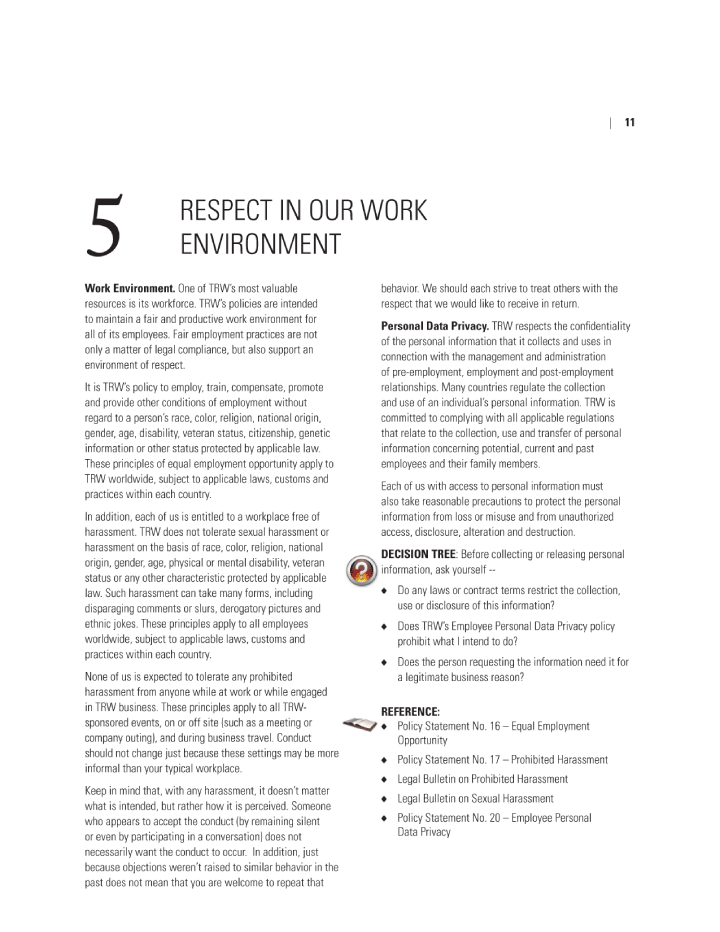
| RESPECT IN OUR WORK ENVIRONMENT Work Environment One of TRW’s most valuable resources is its workforce TRW’s policies are intended to maintain a fair and productive work environment for all of its employees Fair employment practices are not only a matter of legal compliance, but also support an environment of respect It is TRW’s policy to employ, train, compensate, promote and provide other conditions of employment without regard to a person’s race, color, religion, national origin, gender, age, disability, veteran status, citizenship, genetic information or other status protected by applicable law These principles of equal employment opportunity apply to TRW worldwide, subject to applicable laws, customs and practices within each country In addition, each of us is entitled to a workplace free of harassment TRW does not tolerate sexual harassment or harassment on the basis of race, color, religion, national origin, gender, age, physical or mental disability, veteran status or any other characteristic protected by applicable law Such harassment can take many forms, including disparaging comments or slurs, derogatory pictures and ethnic jokes These principles apply to all employees worldwide, subject to applicable laws, customs and practices within each country None of us is expected to tolerate any prohibited harassment from anyone while at work or while engaged in TRW business These principles apply to all TRW-sponsored events, on or off site (such as a meeting or company outing), and during business travel Conduct should not change just because these settings may be more informal than your typical workplace Keep in mind that, with any harassment, it doesn’t matter what is intended, but rather how it is perceived Someone who appears to accept the conduct (by remaining silent or even by participating in a conversation) does not necessarily want the conduct to occur In addition, just because objections weren’t raised to similar behavior in the past does not mean that you are welcome to repeat that behavior We should each strive to treat others with the respect that we would like to receive in return Personal Data Privacy TRW respects the confi dentiality of the personal information that it collects and uses in connection with the management and administration of pre-employment, employment and post-employment relationships Many countries regulate the collection and use of an individual’s personal information TRW is committed to complying with all applicable regulations that relate to the collection, use and transfer of personal information concerning potential, current and past employees and their family members Each of us with access to personal information must also take reasonable precautions to protect the personal information from loss or misuse and from unauthorized access, disclosure, alteration and destruction DECISION TREE: Before collecting or releasing personal information, ask yourself — Do any laws or contract terms restrict the collection, use or disclosure of this information? Does TRW’s Employee Personal Data Privacy policy prohibit what I intend to do? Does the person requesting the information need it for a legitimate business reason? REFERENCE: Policy Statement No 16 – Equal Employment Opportunity Policy Statement No 17 – Prohibited Harassment Legal Bulletin on Prohibited Harassment Legal Bulletin on Sexual Harassment Policy Statement No 20 – Employee Personal Data Privacy |
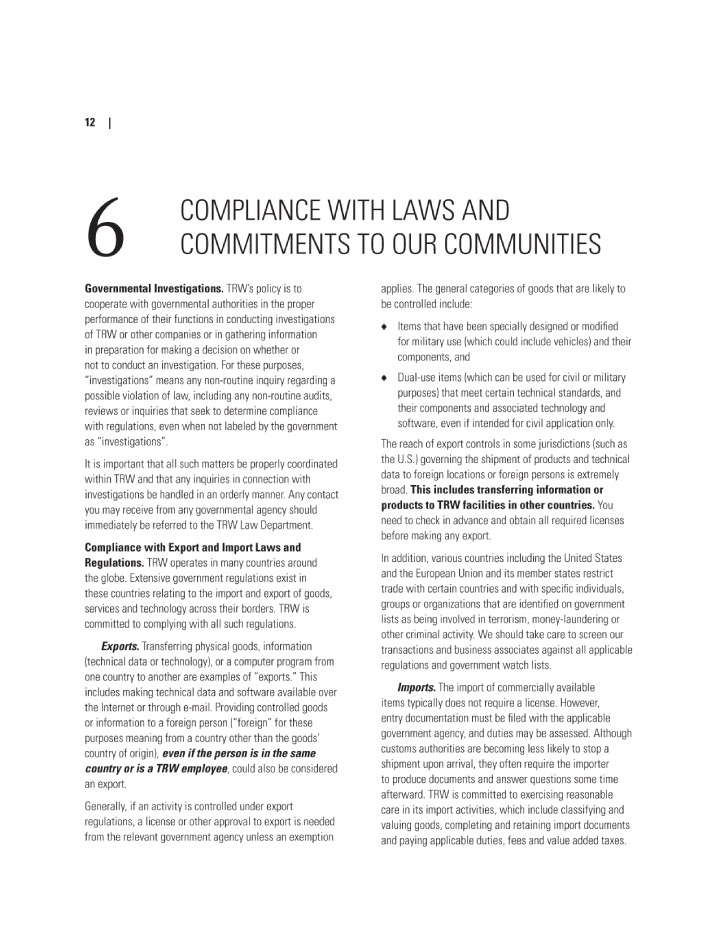
| COMPLIANCE WITH LAWS AND COMMITMENTS TO OUR COMMUNITIES Governmental Investigations TRW’s policy is to cooperate with governmental authorities in the proper performance of their functions in conducting investigations of TRW or other companies or in gathering information in preparation for making a decision on whether or not to conduct an investigation For these purposes, “investigations” means any non-routine inquiry regarding a possible violation of law, including any non-routine audits, reviews or inquiries that seek to determine compliance with regulations, even when not labeled by the government as “investigations” It is important that all such matters be properly coordinated within TRW and that any inquiries in connection with investigations be handled in an orderly manner Any contact you may receive from any governmental agency should immediately be referred to the TRW Law Department Compliance with Export and Import Laws and Regulations TRW operates in many countries around the globe Extensive government regulations exist in these countries relating to the import and export of goods, services and technology across their borders TRW is committed to complying with all such regulations Exports Transferring physical goods, information (technical data or technology), or a computer program from one country to another are examples of “exports ” This includes making technical data and software available over the Internet or through e-mail Providing controlled goods or information to a foreign person (“foreign” for these purposes meaning from a country other than the goods’ country of origin), even if the person is in the same country or is a TRW employee, could also be considered an export Generally, if an activity is controlled under export regulations, a license or other approval to export is needed from the relevant government agency unless an exemption applies The general categories of goods that are likely to be controlled include: Items that have been specially designed or modifi ed for military use (which could include vehicles) and their components, and Dual-use items (which can be used for civil or military purposes) that meet certain technical standards, and their components and associated technology and software, even if intended for civil application only The reach of export controls in some jurisdictions (such as the U S ) governing the shipment of products and technical data to foreign locations or foreign persons is extremely broad This includes transferring information or products to TRW facilities in other countries You need to check in advance and obtain all required licenses before making any export In addition, various countries including the United States and the European Union and its member states restrict trade with certain countries and with specifi c individuals, groups or organizations that are identifi ed on government lists as being involved in terrorism, money-laundering or other criminal activity We should take care to screen our transactions and business associates against all applicable regulations and government watch lists Imports The import of commercially available items typically does not require a license However, entry documentation must be fi led with the applicable government agency, and duties may be assessed Although customs authorities are becoming less likely to stop a shipment upon arrival, they often require the importer to produce documents and answer questions some time afterward TRW is committed to exercising reasonable care in its import activities, which include classifying and valuing goods, completing and retaining import documents and paying applicable duties, fees and value added taxes |
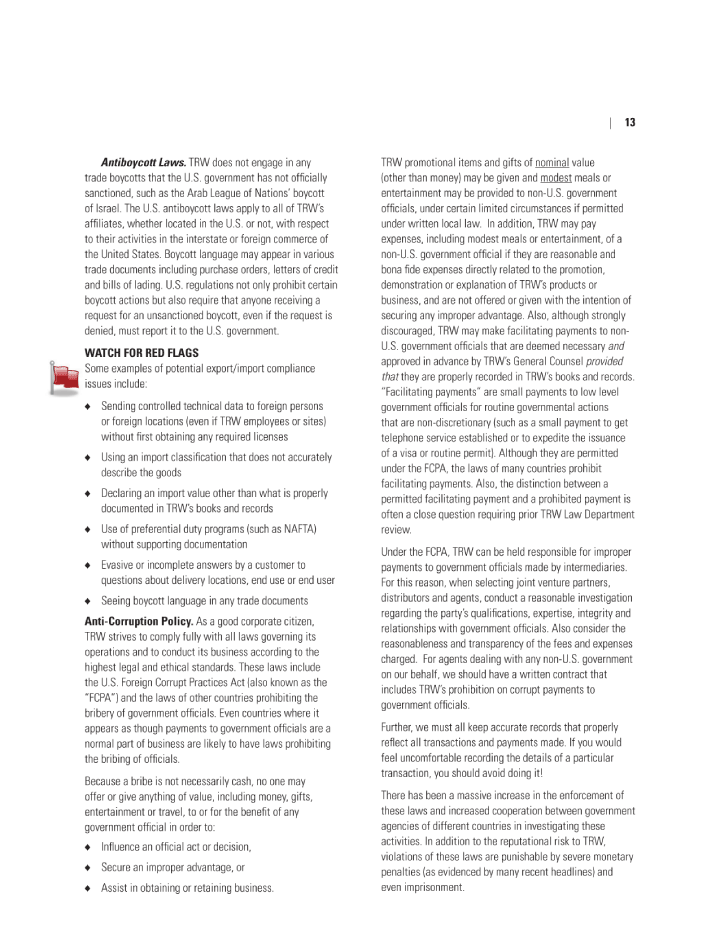
| Antiboycott Laws TRW does not engage in any trade boycotts that the U S government has not offi cially sanctioned, such as the Arab League of Nations’ boycott of Israel The U S antiboycott laws apply to all of TRW’s affi liates, whether located in the U S or not, with respect to their activities in the interstate or foreign commerce of the United States Boycott language may appear in various trade documents including purchase orders, letters of credit and bills of lading U S regulations not only prohibit certain boycott actions but also require that anyone receiving a request for an unsanctioned boycott, even if the request is denied, must report it to the U S government WATCH FOR RED FLAGS Some examples of potential export/import compliance issues include: Sending controlled technical data to foreign persons or foreign locations (even if TRW employees or sites) without fi rst obtaining any required licenses Using an import classifi cation that does not accurately describe the goods Declaring an import value other than what is properly documented in TRW’s books and records Use of preferential duty programs (such as NAFTA) without supporting documentation Evasive or incomplete answers by a customer to questions about delivery locations, end use or end user 3 Seeing boycott language in any trade documents Anti-Corruption Policy As a good corporate citizen, TRW strives to comply fully with all laws governing its operations and to conduct its business according to the highest legal and ethical standards These laws include the U S Foreign Corrupt Practices Act (also known as the “FCPA”) and the laws of other countries prohibiting the bribery of government offi cials Even countries where it appears as though payments to government offi cials are a normal part of business are likely to have laws prohibiting the bribing of offi cials Because a bribe is not necessarily cash, no one may offer or give anything of value, including money, gifts, entertainment or travel, to or for the benefi t of any government offi cial in order to: Infl uence an offi cial act or decision, Secure an improper advantage, or Assist in obtaining or retaining business TRW promotional items and gifts of nominal value (other than money) may be given and modest meals or entertainment may be provided to non-U S government offi cials, under certain limited circumstances if permitted under written local law In addition, TRW may pay expenses, including modest meals or entertainment, of a non-U S government offi cial if they are reasonable and bona fi de expenses directly related to the promotion, demonstration or explanation of TRW’s products or business, and are not offered or given with the intention of securing any improper advantage Also, although strongly discouraged, TRW may make facilitating payments to non-U S government offi cials that are deemed necessary and approved in advance by TRW’s General Counsel provided that they are properly recorded in TRW’s books and records “Facilitating payments” are small payments to low level government offi cials for routine governmental actions that are non-discretionary (such as a small payment to get telephone service established or to expedite the issuance of a visa or routine permit) Although they are permitted under the FCPA, the laws of many countries prohibit facilitating payments Also, the distinction between a permitted facilitating payment and a prohibited payment is often a close question requiring prior TRW Law Department review Under the FCPA, TRW can be held responsible for improper payments to government offi cials made by intermediaries For this reason, when selecting joint venture partners, distributors and agents, conduct a reasonable investigation regarding the party’s qualifi cations, expertise, integrity and relationships with government offi cials Also consider the reasonableness and transparency of the fees and expenses charged For agents dealing with any non-U S gove rnment on our behalf, we should have a written contract that includes TRW’s prohibition on corrupt payments to government offi cials Further, we must all keep accurate records that properly refl ect all transactions and payments made If you would feel uncomfortable recording the details of a particular transaction, you should avoid doing it! There has been a massive increase in the enforcement of these laws and increased cooperation between government agencies of different countries in investigating these activities In addition to the reputational risk to TRW, violations of these laws are punishable by severe monetary penalties (as evidenced by many recent headlines) and even imprisonment |
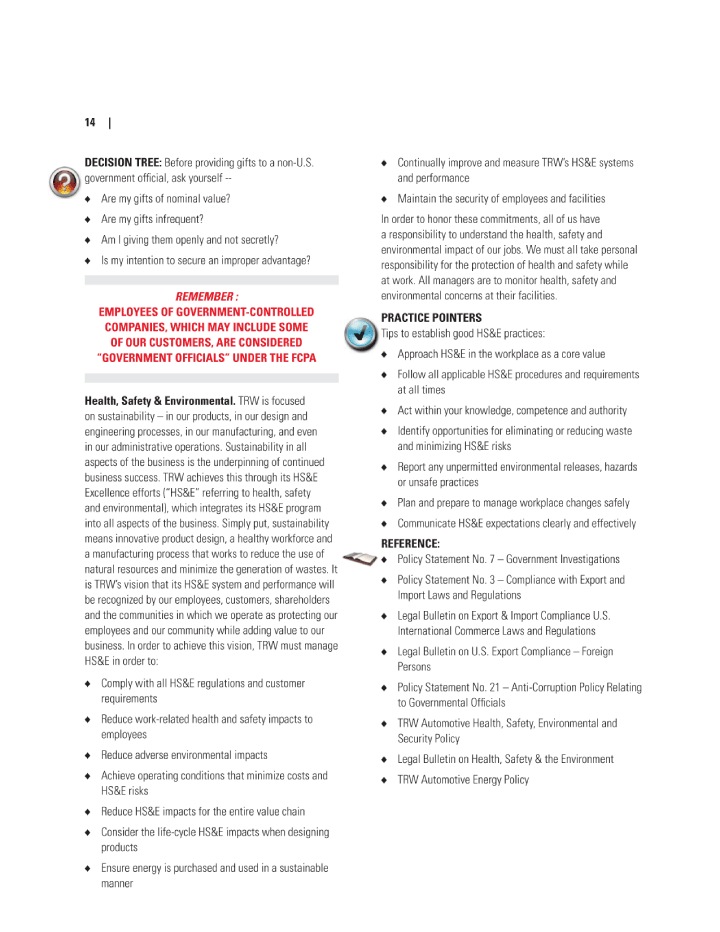
| DECISION TREE: Before providing gifts to a non-U S government offi cial, ask yourself — Are my gifts of nominal value? Are my gifts infrequent? Am I giving them openly and not secretly? Is my intention to secure an improper advantage? REMEMBER : EMPLOYEES OF GOVERNMENT-CONTROLLED COMPANIES, WHICH MAY INCLUDE SOME OF OUR CUSTOMERS, ARE CONSIDERED “GOVERNMENT OFFICIALS” UNDER THE FCPA Health, Safety & Environmental TRW is focused on sustainability – in our products, in our design and engineering processes, in our manufacturing, and even in our administrative operations Sustainability in all aspects of the business is the underpinning of continued business success TRW achieves this through its HS&E Excellence efforts (“HS&E” referring to health, safety and environmental), which integrates its HS&E program into all aspects of the business Simply put, sustainability means innovative product design, a healthy workforce and a manufacturing process that works to reduce the use of natural resources and minimize the generation of wastes It is TRW’s vision that its HS&E system and performance will be recognized by our employees, customers, shareholders and the communities in which we operate as protecting our employees and our community while adding value to our business In order to achieve this vision, TRW must manage HS&E in order to: Comply with all HS&E regulations and customer requirements Reduce work-related health and safety impacts to employees Reduce adverse environmental impacts Achieve operating conditions that minimize costs and HS&E risks Reduce HS&E impacts for the entire value chain Consider the life-cycle HS&E impacts when designing products Ensure energy is purchased and used in a sustainable manner Continually improve and measure TRW’s HS&E systems and performance 3 Maintain the security of employees and facilities In order to honor these commitments, all of us have a responsibility to understand the health, safety and environmental impact of our jobs We must all take personal responsibility for the protection of health and safety while at work All managers are to monitor health, safety and environmental concerns at their facilities PRACTICE POINTERS Tips to establish good HS&E practices: Approach HS&E in the workplace as a core value Follow all applicable HS&E procedures and requirements at all times Act within your knowledge, competence and authority Identify opportunities for eliminating or reducing waste and minimizing HS&E risks Report any unpermitted environmental releases, hazards or unsafe practices Plan and prepare to manage workplace changes safely Communicate HS&E expectations clearly and effectively REFERENCE: Policy Statement No 7 – Government Investigations Policy Statement No 3 – Compliance with Export and Import Laws and Regulations Legal Bulletin on Export & Import Compliance U S International Commerce Laws and Regulations Legal Bulletin on U S Export Compliance – Foreign Persons Policy Statement No 21 – Anti-Corruption Policy Relating to Governmental Offi cials TRW Automotive Health, Safety, Environmental and Security Policy Legal Bulletin on Health, Safety & the Environment TRW Automotive Energy Policy |
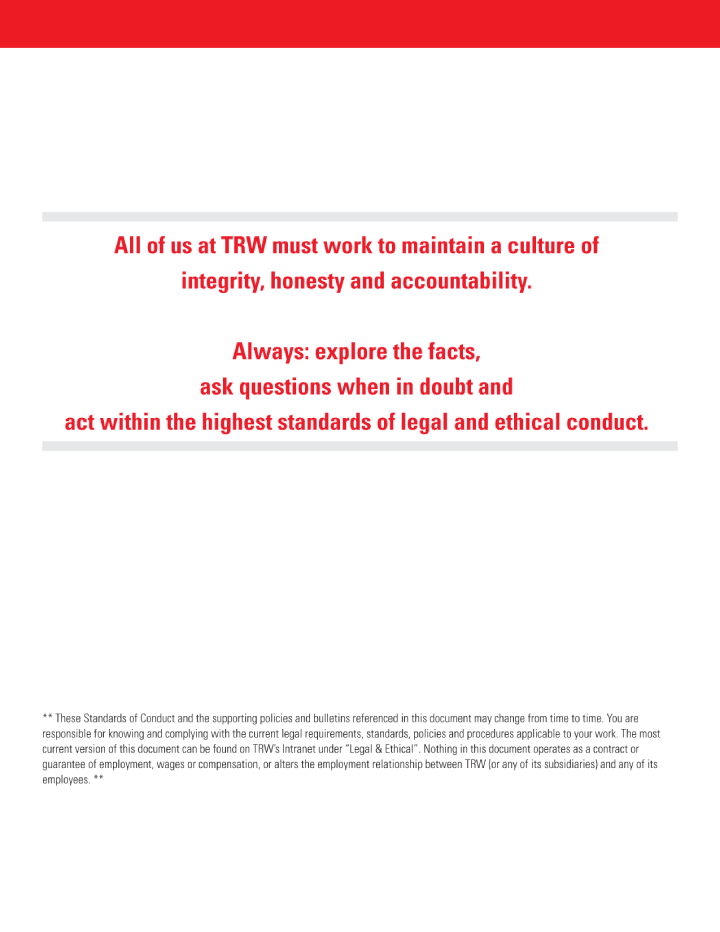
| All of us at TRW must work to maintain a culture of integrity, honesty and accountability Always: explore the facts, ask questions when in doubt and act within the highest standards of legal and ethical conduct ** These Standards of Conduct and the supporting policies and bulletins referenced in this document may change from time to time You are responsible for knowing and complying with the current legal requirements, standards, policies and procedures applicable to your work The most current version of this document can be found on TRW’s Intranet under “Legal & Ethical” Nothing in this document operates as a contract or guarantee of employment, wages or compensation, or alters the employment relationship between TRW (or any of its subsidiaries) and any of its employees ** |
